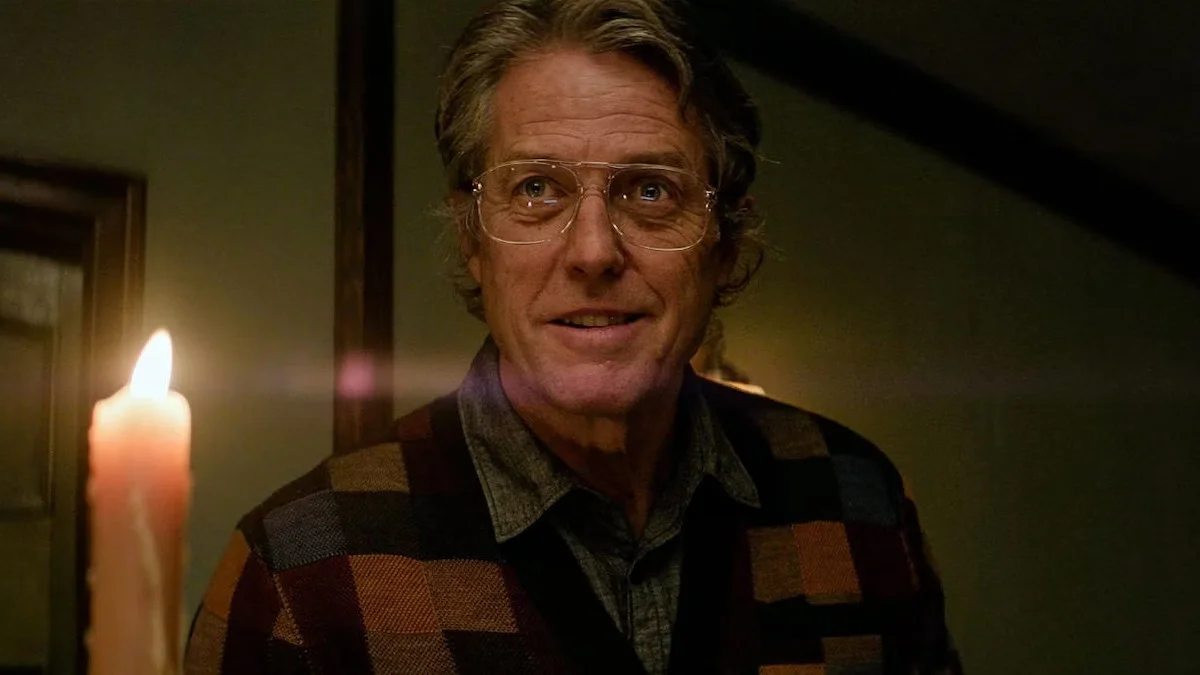Hugh Grant might be new to horror-thrillers, but his unforgettable turn in Heretic has sparked both laughter and dread in audiences worldwide. Directed by Scott Beck and Bryan Woods (A Quiet Place), the film has quickly become a cult favorite, blending deep theological debates with dark humor and unsettling suspense. Beck and Woods recently sat down to discuss the making of the film, the inspiration behind its pop culture metaphors, and one scene-stealing cameo that left audiences both amused and perplexed.
Pop Culture as Theology
At its core, Heretic is a cerebral exploration of faith and control, but it doesn’t rely on dense sermons to make its points. Instead, the film uses pop culture references to convey its complex ideas—one of the most memorable being a comparison of Christian and Mormon mythology to Star Wars: Episode I – The Phantom Menace.
This approach was born out of necessity, says co-writer Bryan Woods. “We spent years researching religion, cults, and atheism to make Mr. Reed’s character as intellectually intimidating as possible,” he explains. “But we realized we needed to make his ideas accessible, not just to the audience, but to us as writers who didn’t start out as experts.”
One of the most inspired metaphors came in the form of the game Monopoly. As Woods describes, “We loved the history of the game, which began as a critique of capitalism before being co-opted into something entirely different. It mirrored how religions often evolve from their origins into tools of control.”
Hugh Grant’s Jar Jar Moment
In one of the film’s standout scenes, Grant’s Mr. Reed draws parallels between religious lore and the infamous Star Wars prequel, leading to an impromptu Jar Jar Binks impression that had audiences in stitches.
This moment was entirely unscripted, reveals Beck. “Hugh didn’t show us his Jar Jar until we rolled cameras. That’s just how he works—holding back these little surprises to keep things fresh and authentic.”
Grant, however, offered a shocking confession during interviews: “One of my guiltiest secrets is that I’ve never seen a Star Wars movie,” he admitted. “I did watch a snippet on YouTube to prepare, but that’s about it.”
The Anti-Climactic Joy of Topher Grace
Another surprising element of Heretic is the inclusion of Elder Kennedy, played by Topher Grace. Introduced as a concerned church elder sent to check on the missing missionaries, his character bucks audience expectations. Instead of saving the day or meeting a grisly fate, Elder Kennedy merely offers Mr. Reed a pamphlet before exiting the story.
This “anti-climax,” as Woods calls it, was entirely intentional. “Normally, anti-climaxes are a writer’s nightmare, but we wanted to play with that idea. Religion, in a way, is full of beautiful but sometimes disappointing ambiguities. Elder Kennedy represents that. He’s not a hero, not a victim—just a guy doing his job in the most ineffective way possible.”
For Grace, the subversion was part of the fun. “Topher understood exactly what we were going for,” says Beck. “We needed an actor with enough audience rapport to set up expectations we could completely shatter. His inclusion is one of my favorite misdirects in the film.”
Dark Humor Meets Horrific Theology
While Heretic deals with heavy themes, Beck and Woods were adamant about incorporating moments of levity to balance the tone. Grant’s performance was key to achieving this balance, with his dry wit and spontaneous improvisations giving the film a unique edge.
One example is the blueberry pie-scented labeled candle in Mr. Reed’s home, which becomes a recurring motif. “Hugh’s delivery when he first mentions the candle is so disarmingly funny,” Beck says. “It’s absurd, but that absurdity makes the darker moments hit even harder.”
Final Thoughts
From its theological underpinnings to its laugh-out-loud pop culture references, Heretic is a movie that defies easy categorization. Beck and Woods have crafted a film that’s as thought-provoking as it is entertaining, and with Hugh Grant at the helm of its madness, it’s no wonder Heretic is sparking debates and earning fans everywhere.
As Woods puts it, “Whether you love the movie for its themes, its performances, or even just the Monopoly metaphor, we hope it leaves you with something to think about. And if you leave the theater wondering about Hugh Grant’s Jar Jar Binks impression, well, that’s just a bonus.”

